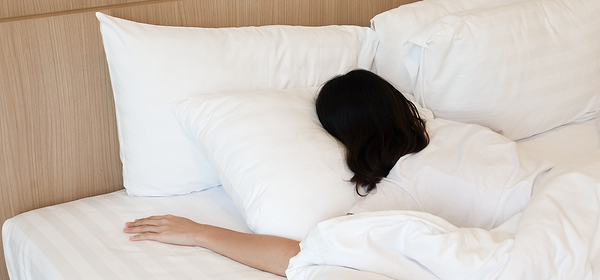Up, down or somewhere in between, the levels of your hormones can affect different parts of your health and happiness. We know that hormones govern the menstrual cycle and key points of reproductive life such as puberty, pregnancy and menopause, but how much do they affect other parts of life – such as sleep?
What do hormones actually do?
Before we look at how hormones may affect sleep, let’s learn a little bit more about them. Hormones are like chemical messengers. They move around the body and tell different organs and body parts to do different things.
For example, the main female hormone, oestrogen, helps to grow the lining of the uterus (womb) that is shed as part of the period, yet it also plays an important role in mood and mental health.
Progesterone, another female hormone, works in tandem with oestrogen to coordinate the period, and also has a crucial role in breast health.
Not only do levels of these hormones rise and fall according to a particular pattern of the menstrual cycle, they can also change dramatically according to your life stage. Here is a rundown on how they may impact sleep.
Feeling fatigued before your period?
Research on how the menstrual cycle affects sleep has produced puzzling results, with most studies finding no clear link between changing hormone levels and sleep quality or quantity in healthy young women. However, speak to any GP or hormone specialist, and they will tell you that many women report feeling more fatigued just before or during their period.
Jean Hailes endocrinologist Dr Sonia Davison explains. “Certainly, it is not uncommon for women to feel extra tired in the days leading up to and around their period,” says Dr Davison. “Unfortunately, the research hasn’t been able to pinpoint exactly why this occurs.
“We do know that for most women their progesterone levels peak before the period and then drop quite sharply. Oestrogen levels fall around this time too, so it’s possible that these big shifts in hormones are playing a part and impacting sleep and fatigue.
“For some women, the extra feeling of tiredness may also be due to the associated experiences of having their period, such as period pain, a migraine or premenstrual syndrome (PMS). Pain and distress around your period can significantly disrupt sleep and relaxation time, causing low energy and fatigue for the next few days.”
Sleep-deprived midlife and beyond
It is very common that women in the perimenopause (the early phase of menopause), menopause and post-menopause experience sleep problems. This can include difficulty falling asleep, as well as waking early or many times through the night.
There are many factors thought to be involved here, with hormones potentially being one of them, says Dr Davison.
“Oestrogen levels start to fall when women reach their mid to late 40s, with a dramatic reduction around menopause. This coincides with the common experience of disrupted sleep,” she says.
Other hormone-related issues that commonly impact sleep around menopause are night sweats and mental health changes such as anxiety or depression.
Read more about menopause and sleeping problems for midlife women.
Rise and fall to your own rhythm
Of course, every woman is an individual, with hormones rising and falling to our own pattern or life stage. Many of us already have a lot on our plates, so it can be helpful to know when your energy may be a bit lower, or why your sleep is worse at a particular time.
On these days or during these life stages, allow for more downtime – more rest and relaxation – and go easier on yourself. Your hormones and your body are doing a lot behind the scenes, and when it comes to sleep and fatigue, often it’s better to go with the flow than try to swim against the tide.
Find out why women need more sleep than men or read more about sleep and fatigue on the Jean Hailes website.
Published with the permission of Jean Hailes for Women’s Health or call toll free 1800 JEAN HAILES (532 642).
Related articles:
Sleep: tips to get enough
How your sleeping position affects your health

